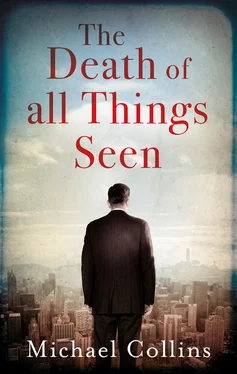If he had showed as requested, it would have favored the Feldmans. He knew it. Nate, rising to meet him, a sherry or brandy proffered, something Feldman-like, the gracious reach and quiet accommodation, and Norman, the obsequious and simpering recipient of such airs and graces, where there would be no question of Norman paying. It was billed to the room, all taken care of, the expediency and decorum of a man versed in gaining the subtle upper hand.
It coursed through Norman, the sense of envy, this Feldman stock, this great breeding, and Nate Feldman, in crossing his legs, in the attitude of relaxed consideration, would begin, and so politely, conveying his sympathies, how sorry he was for the tumult and violent nature of Helen’s death. He had read about it. Such a dreadful business, the way it occurred, quietly suggesting that he hoped it had nothing to do with his father.
It would be textbook Feldman, Nate seeking not so much to exonerate his father, but to extend his father’s influence, advancing some preternatural hold Mr Feldman had over others, all this serving the Feldman name — the Feldman mythos.
Norman could see it no other way, and what the Hell right did Nate Feldman have to interfere with his life? This was the Feldmans’ presumptive pedigree — all they were, and what he, Helen, and Walter weren’t.
Fuck the Feldmans! There was a name for a play. He said it under his breath. It stood as a singular indictment. If Nate had the audacity to impose on his life, then Norman would hang the name Feldman out to dry for the world to see, Nate, that goddamn Draft Dodger, and that insufferable father of his, that mincer of words, that ineffectual fop. The truth of it, the insurance company had gone near bankrupt under his charge, the Chicago office slashed and re-staffed with temps. He was a goddamn drunk, and everyone knew it! No wonder he jumped to his goddamn death!
Norman was indisposed. Yes, that was it! His secretary had just informed him of the conflicting date. He had a pressing deadline on a new play. He hoped Nate would understand. He was muttering words as he began writing out the email, suddenly confronted in the construction of a lie, whether he should give his secretary a name or not, and, in the imagined sense that he had a secretary, he thought of his mother and Mr Feldman and all that had come before. It made him angry that Helen Price was his mother and that he was attached to a past and to a woman like that.
He was still in the midst of writing his excuse, when he looked up and saw Joanne advancing across the street with Grace.
*
Grace was dressed in a smart black wool blazer, pleated tartan skirt, white ankle socks and patent leather Mary Janes. Joanne slipped Norman a primrose-colored envelope with a raised seal that contained the receipt. She made Grace turn like a figure on a music box.
In quietly observing Grace, Joanne said, ‘We are all being slowly poisoned. You know that, right?’ She was referring to McDonald’s.
Norman knew, or he had heard the story umpteen times, about a chicken nugget that had purportedly lasted six months beneath a car seat and showed no sign of decay. It had gone viral on YouTube. Joanne began to repeat the story.
Norman added in a mildly contentious way, ‘It’s the sort of event that would have constituted a miracle in biblical times. Maybe we’re just tired of miracles.’
His comment was met with a tisk of mild admonishment. Undeterred, Joanne said, ‘Doesn’t she look beautiful?’
There was no denying Grace’s exoticness. In her outfit, she looked to Norman like a smarmy character from an upmarket children’s book. Madeline . He wasn’t quite sure if the story was set in Paris or New York, or if Madeline was even French.
It didn’t quite matter. What mattered was that the Madeline series was there in his mind at all, suggesting a lamentable downward reach of art and story, the economy of words and sparse images, one diminished form propping up the other in the shorthanded way these stories worked; parents trawling to unearth what might engage a four-year-old or, more accurately, what might engage the sensibilities of overbearing mothers who felt they knew what might engage a four-year-old, when it wasn’t established what a four-year-old might genuinely be interested in at all. It didn’t matter, the entire children’s book industry was in the service of parents, not children.
There were times when Norman lamented the serviceability and truism of the TV shows of the fifties and sixties, a confederacy of ordinary left to sit before shows like Tom and Jerry, Tweety Bird and Sylvester the Cat or The Road Runner , when the message was less ambiguous, when life was all about the chase, and where, in just about every scene, you got a frying pan in the face, or you stepped in the spring of a bear trap, or you ended up holding sticks of dynamite that blew up in your face. These characters should have been on currency for the Truths they harbored.
Norman kept looking at Grace, the cardboard cut-out of her features, the flat face and the slanted eyes, the composite shorthand identifying features a good illustrator could turn into a signature series. And then the question surfaced, why couldn’t he do the same? A compendium of Grace & Randolph books — Grace & Randolph Learn the Hard Truth About China’s One Child Policy; Grace & Randolph Get Undercut in the Lemonade Stand Business and Learn Hard and Fast Truths about Outsourcing; Grace & Randolph Learn About Derivatives and Futures and Why Daddy Won’t Sleep with Mommy Anymore and is Banging his Secretary .
He knew his main problem had always been having too large a vocabulary and having too much to say. It was anathema for an artist. Maybe he could go with a Chinese Alphabet book, be ahead of the curve in the insipid way parents were now anticipating the reality of what was fast approaching — the decline of the West.
*
Joanne was suddenly interested in an organic quiche and pine nut kale salad. The café had juices starting at $6.95.
A clutch of older women had been quietly assessing Grace. Norman caught their eye as one of the elderlies volunteered that her granddaughter was learning Chinese. She gave Norman an obliging smile. It was obvious they had been disparagingly querying who had the sexual problem, Norman or Joanne.
Norman said, ‘It came down to a Bichon Frise, a Shih Tzu, or her. She won out, on account of the prospect that she has a longer lifespan and we might end up living off her.’
It set the elderlies on edge.
A man in a get-up of yellow cashmere sweater and tomato red pants came across to their table in a quiet arbitration of glowing familiarity. He gave off a new car smell. His name was Roger Carlyle. He was in real estate. His face was on his business card. That seemed to be his essential credential, a face.
Norman could see Roger give Joanne the once over. Roger, it turned out, had a tape recorder. He wanted to know if Grace would like to record the Pledge of Allegiance? It was a sales quirk, something he burned to a CD for anybody who bought a house.
Joanne was quietly flustered. Roger had his eye on her. Obviously, she controlled the purse strings, or Roger was giving her the impression he thought so. Norman could see the spark of intrigue Roger engendered in Joanne. This was like someone hitting on your kid sister. It let him understand, too, something deeper about Joanne, about what sort of man she might let enter her life. She was seeking alternatives.
Joanne admitted that Grace didn’t know the Pledge of Allegiance. It didn’t dissuade Roger. He had a contingency plan, a laminated card, like a prayer card, with the pledge on it. She could read it.
Norman intervened. Grace wasn’t, in fact, reading English yet! He said by way of distracting Roger, ‘Isn’t it true that The Breakfast Club was filmed near here?’ which, in fact, it had been, at New Trier East, and ‘Wasn’t Home Alone also filmed here?’
Читать дальше












